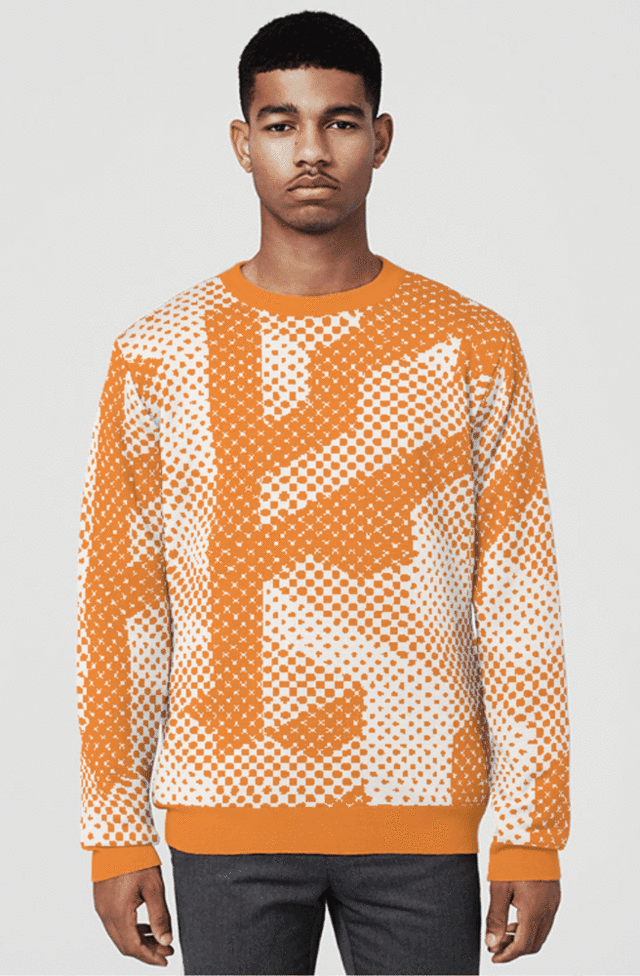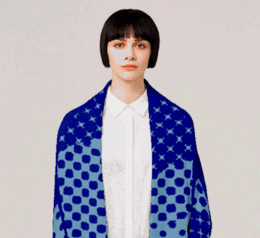When you get a new shirt or pair of pants, the process is typically the same. Browse your favorite online or brick-and-mortar store, hem and haw over how it makes you look (great, of course!), add to cart, checkout. The retailer has decided what items are on offer and you're limited to the designs someone else has deemed worthy enough to produce.
Knyttan, a startup based in London, wants to throw a wrench in this ecosystem and bring mass customization to the world of fashion.
"Designers creating products have been on a pedestal where they made all the decisions; now customers are allowed to change things to their liking," says Hal Watts, a cofounder, along with Ben Alun-Jones and Kirsty Emery, of Knyttan.
Here's how it works: Visit Knyttan's website, pick an article of clothing (the brand started with knitted scarves and sweaters), select the pattern and color combination you want, and use an online tool to tweak how it looks—you can adjust the pattern's placement, the line weights, and invert the colors if you please.

The digital file is sent to a computer-controlled Stoll knitting machine—the same equipment that's used by some of the largest clothing manufacturers around the world—and woven using 100% merino wool. Knyttan's shop is located in Somerset House—a neoclassical building in the heart of London—and the production takes place right there, under one roof. The finishing touch: an embroidered label listing your name as a designer.
"Clothing is tricky since manufacturing is outsourced to developing countries," Watts says. "Fashion brands don't have as much control over the supply chain compared to other industries, like electronics. There are big problems with minimum order volumes and lead times are long. It's challenging for small- and medium-size designers."
With this system of on-demand production, it's just as easy to make one item as it is to make 100.
Knyttan seeks to empower customers in the creative process but it also provides a valuable platform for emerging practitioners to break into the industry. The company hand-picked the group of fashion and digital designers represented in its inaugural line, which includes Moniker, an Amsterdam-based interaction and media design studio; Nicolas Sassoon, a designer known for animated GIFs; and Holly Halkes, a fashion student. "They're experimental and comfortable with allowing customization of their work," Watts says.

While "mass customization" has been a fashion-industry buzzphrase for a few years now, Knyttan has been able to address pain points that other companies haven't been able to conquer: lead time, the ease of using customization tools, and flexibility with production. For example, it takes about four weeks to get your hands on pair of shoes ordered through Nike iD and they're still made overseas. Knyttan's scarves take about 20 minutes to fabricate and sweaters take about 1.5 hours. The company also developed software that makes the knitting machines more nimble and the customization tools on its website are delightfully uncomplicated.
Another hurdle is the crisis of choice. With too many options, the end result could skew toward the Frankenstein end of the spectrum. Knyttan controls the variables so the process is foolproof. There's room to experiment, but no matter what you do, the end result will always look good. "I think that's the most difficult side of things, how much freedom to give a person to affect their product," Watts says. "You don't want to give them a blank canvas and no parameters. Some won't have the needed skills."
Knyttan initially launched its site last year just to test the concept and prove that it works. So far it has sold around 500 units direct to consumers. Now the project is on hold as the company focuses its energy on hiring more people and making the systems more efficient and scalable. Knyttan just closed a round of seed funding—they did not disclose the amount—to expand the business and will relaunch in fall 2015 with an expanded roster of collaborators.
"We have an ambitious plan to change the industry," Watts says. "Right now, we call it 'mass customization,' but I think that's how everything will eventually be made. Customers want a unique element to the products they buy. It's becoming the norm for the industry. For example, the Apple watch has something like 10,000 permutations (editor's note: it's actually closer to the hundreds) on its website. Everyone will want a say in the products they purchase. That's how it was until mass production began. We're at a point where technology can reintroduce customization into mass production." Watts estimates that this paradigm shift will occur in the next decade.
Knyttan's goal to be a key player in the fashion revolution and its efforts to rethink domestic production are ambitious; however, the initial prices range from a $120 scarf to a $300 sweater—a heftier sum than most people are comfortable dropping on a single item, and a fact that's not lost on Watts. "Customers are aware that the reason H&M can sell a jumper for $9.99 is due to slave labor," he says of the fast-fashion industry. "There's a balance between how much consumers pay and the cost to produce locally. People are willing to spend more for higher quality and for ethical production. Reactions have ranged from 'this is too expensive' to 'this is great.'"
Whether or not you end up buying a piece from Knyttan when they reveal the new big-name collaborations and start shipping this fall, the site is pretty fun to play with. Try your hand as a clothing designer here.
Correction: An earlier version of this story incorrectly stated the source of funding. It's "seed" not "series C."